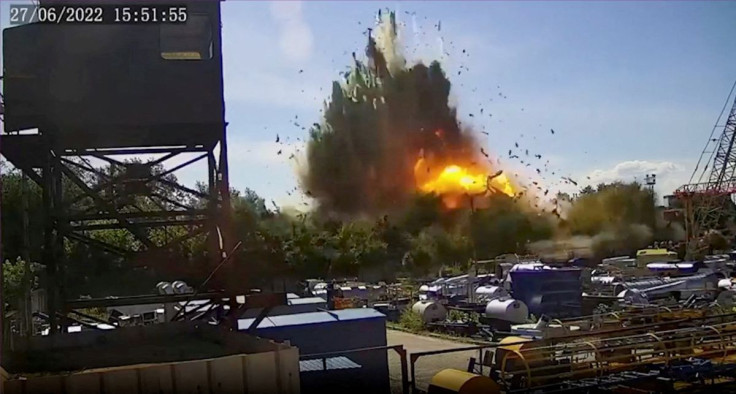NATO Vows To Modernise Ukraine's Military To Fight Off Russian Invasion

NATO on Wednesday branded Russia the most "direct threat" to allied security after Moscow's invasion of Ukraine and vowed to modernise Kyiv's beleaguered armed forces, saying it stood four-square behind Ukrainians' "heroic defence of their country".
Completing a summit dominated by the invasion and the geopolitical upheaval it has prompted, NATO formally invited Sweden and Finland to join the alliance and pledged to reinforce combat-ready and rapid-reaction forces on its eastern flank, closest to Russia.
President Joe Biden announced additional U.S. land, air and sea deployments across Europe from Spain in the west to Romania and Poland bordering Ukraine. They included a permanent army headquarters with accompanying battalion in Poland - the first
full-time U.S. deployment on NATO's eastern fringes.
As the 30 national NATO leaders were meeting in Madrid, Russian forces intensified attacks in Ukraine, including missile strikes on the southern Mykolaiv region close to front lines.
The mayor of Mykolaiv city said a Russian missile had killed at least five people in a residential building there, while Moscow said its forces had hit what it called a training base for foreign mercenaries in the region.
The governor of eastern Luhansk province reported "fighting everywhere" in a battle around the hilltop city of Lysychansk, which Russian forces are trying to encircle as they gradually advance in a campaign to conquer all of Ukraine's industrialised eastern Donbas region on behalf of separatist proxies.
Ukrainian President Volodymyr Zelenskiy reiterated to NATO leaders that Kyiv needed more weapons and money, and faster, to erode Russia's huge edge in artillery and missile firepower, and warned that the Kremlin's ambitions did not stop at Ukraine.
Ukrainian Foreign Minister Dmytro Kuleba praised NATO's "clear-eyed stance" on Russia and said the summit outcome proved "it can take difficult but essential decisions".
He added: "An equally strong and active position on Ukraine will help to protect Euro-Atlantic security and stability."
Kyiv has voiced concern that the West has been slow to offer it more than moral support against an invasion that has devastated cities, killed thousands and sent millions fleeing.
'FULL SOLIDARITY'
A NATO communique called Russia the "most significant and direct threat to the allies' security and stability", a nod to the precipitous deterioration in relations with Russia - earlier classified as a "strategic partner" - since the invasion.
Russia's "war of aggression against Ukraine has shattered peace and gravely altered our security environment," NATO said in a new Strategic Concept document, its first since 2010.
"A strong independent Ukraine is vital for the stability of the Euro-Atlantic area."
NATO agreed a package of support aimed at modernising Ukraine's largely Soviet-era military. "We stand in full solidarity with the government and the people of Ukraine in the heroic defence of their country," the communique said.
"We are sending a strong message to (Russian President Vladimir) Putin: 'You will not win'," said Spanish Prime Minister Pedro Sanchez, the summit's host.
The U.S.-led alliance said it would also deploy more "robust in-place combat-ready forces" on its eastern flank, scaled up from existing battlegroups to brigade-size units.
NATO Secretary General Jens Stoltenberg had announced ahead of the summit that the alliance planned to increase the number of troops on high alert by seven-fold to more than 700,000.
Zelenskiy, in a video link-up with the summit, said Ukraine needed $5 billion per month for its defence and protection.
"This is not a war being waged by Russia against only Ukraine. This is a war for the right to dictate conditions in Europe - for what the future world order will be like," he said.
NATO's invitation to Sweden and Finland to join the bloc marks one of the most momentous shifts in European security in decades as Helsinki and Stockholm drop a tradition of neutrality in response to Russia's invasion.
Russia has long complained about a perceived expansion of Western blocs towards its borders. But its sweep into Ukraine - which it calls a "special military operation" against security threats to Russia - has given new impetus and unity to NATO.
Ukraine and its Western supporters accuse Russia of an unprovoked and imperial-style land grab in Ukraine.
Russian Deputy Foreign Minister Sergei Ryabkov said NATO's expansion was "destabilising" and would not improve its members' security.
GRINDING WAR
Russia's stepped-up attacks in Ukraine, after a missile strike killed at least 18 people in a shopping mall in a central city far from front lines on Monday, come as Russian forces make slow but relentless progress in a war now in its fifth month.
Still, Western analysts say the Russians are suffering heavy casualties and running down resources while the prospect of more Western weapons reaching Ukraine, including long-range missile systems, make Moscow's need to consolidate gains more urgent.
In Mykolaiv, Mayor Oleksandr Senkevych said eight Russian missiles had struck the city, including an apartment block. Photographs showed smoke billowing from a four-storey building with its upper floor partly destroyed.
Russia's defence ministry said its forces carried out strikes on a military training base for "foreign mercenaries" near the city and also hit ammunition fuel storage. Reuters was not able to independently verify the reports.
A river port and ship-building centre just off the Black Sea, Mykolaiv has been a bastion against Russian efforts to push westward towards Ukraine's main port of Odesa.
Mykolaiv regional Governor Vitaliy Kim said Russian shelling had intensified and mostly civilian buildings were being hit.
Oleksander Vilkul, governor of Kryvyi Rih in central Ukraine, said Russian shelling had increased there too.
Rescuers were still searching for dozens of missing at the Kremenchuk mall on Wednesday, two days after the missile strike.
Moscow has denied targeting the mall, saying it had struck an arms depot nearby, which exploded.
Britain's Ministry of Defence said Russia was likely to keep making major strikes in an effort to hamper Ukrainian resupplies to frontlines, and more civilian casualties were likely.
© Copyright Thomson Reuters 2024. All rights reserved.





















